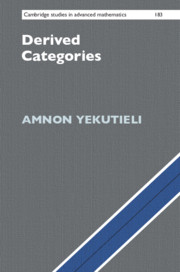Book contents
- Frontmatter
- Dedication
- Contents
- 0 Introduction
- 1 Basic Facts on Categories
- 2 Abelian Categories and Additive Functors
- 3 Differential Graded Algebra
- 4 Translations and Standard Triangles
- 5 Triangulated Categories and Functors
- 6 Localization of Categories
- 7 The Derived Category D(A,M)
- 8 Derived Functors
- 9 DG and Triangulated Bifunctors
- 10 Resolving Subcategories of K(A,M)
- 11 Existence of Resolutions
- 12 Adjunctions, Equivalences and Cohomological Dimension
- 13 Dualizing Complexes over Commutative Rings
- 14 Perfect and Tilting DG Modules over NC DG Rings
- 15 Algebraically Graded Noncommutative Rings
- 16 Derived Torsion over NC Graded Rings
- 17 Balanced Dualizing Complexes over NC Graded Rings
- 18 Rigid Noncommutative Dualizing Complexes
- References
- Index
12 - Adjunctions, Equivalences and Cohomological Dimension
Published online by Cambridge University Press: 15 November 2019
- Frontmatter
- Dedication
- Contents
- 0 Introduction
- 1 Basic Facts on Categories
- 2 Abelian Categories and Additive Functors
- 3 Differential Graded Algebra
- 4 Translations and Standard Triangles
- 5 Triangulated Categories and Functors
- 6 Localization of Categories
- 7 The Derived Category D(A,M)
- 8 Derived Functors
- 9 DG and Triangulated Bifunctors
- 10 Resolving Subcategories of K(A,M)
- 11 Existence of Resolutions
- 12 Adjunctions, Equivalences and Cohomological Dimension
- 13 Dualizing Complexes over Commutative Rings
- 14 Perfect and Tilting DG Modules over NC DG Rings
- 15 Algebraically Graded Noncommutative Rings
- 16 Derived Torsion over NC Graded Rings
- 17 Balanced Dualizing Complexes over NC Graded Rings
- 18 Rigid Noncommutative Dualizing Complexes
- References
- Index
Summary
This chapter is quite varied. In Sections 12.2 and 12.3, there is a detailed look at the derived bifunctors RHom(-,-) and (-⊗L-). In Section 12.4 we study cohomological dimensions of functors. They are used in Section 12.5 to prove some theorems about triangulated functors, such as a sufficient condition for a morphism ζ : F → G of triangulated functors to be an isomorphism. In Sections 12.6 and 12.7 we study several adjunction formulas that involve the derived bifunctors RHom(-,-) and (-⊗L-). We define derived forward adjunction and derived backward adjunction. We prove that if A → B is a quasi-isomorphism of DG rings, then the restriction functor D(B) → D(A) is an equivalence. Resolutions of DG rings are important in several contexts. In Section 12.8 we prove that given a DG K-ring A, there exists a noncommutative semi-free DG ring resolution à → A over K. In Subsection 12.9 there is a theorem providing sufficient conditions for the derived tensor-evaluation morphism to be an isomorphism.In Subsection 12.10 we present some adjunction formulas that pertain only to weakly commutative DG rings.
Keywords
- Type
- Chapter
- Information
- Derived Categories , pp. 289 - 329Publisher: Cambridge University PressPrint publication year: 2019



